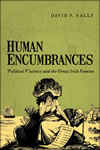Introducing David Nally
 Dr David Nally is University Lecturer at the Geography Department of the University of Cambridge, and Fellow and Director of Studies at Fitzwilliam College. He undertook his undergraduate degree (BA in History and Geography) at University College Cork, Ireland, and obtained his PhD in Geography at the University of British Columbia, Canada, where Professor Derek Gregory supervised his studies. Dr Nally’s research focuses on the political, economic and cultural dimensions of colonisation, the geopolitics of subsistence crises, and the political economy of agrarian change. He is currently working on a genealogy of the concept of ‘food security’.
Dr David Nally is University Lecturer at the Geography Department of the University of Cambridge, and Fellow and Director of Studies at Fitzwilliam College. He undertook his undergraduate degree (BA in History and Geography) at University College Cork, Ireland, and obtained his PhD in Geography at the University of British Columbia, Canada, where Professor Derek Gregory supervised his studies. Dr Nally’s research focuses on the political, economic and cultural dimensions of colonisation, the geopolitics of subsistence crises, and the political economy of agrarian change. He is currently working on a genealogy of the concept of ‘food security’.
Geopolitical Passport
Your relationship with geopolitics
At what age did you discover geopolitics and what attracted you to it?
 Apart from brief introductions as an undergraduate student my route into geopolitics was a circuitous one.
Apart from brief introductions as an undergraduate student my route into geopolitics was a circuitous one.
I became interested in nineteenth-century travel writing, particularly the reports, descriptions and itineraries of British travellers visiting Ireland. My first instinct was to situate these accounts within a larger ‘cultural of travel’ that characterised European colonial exploration – that was until I read James Scott’s extraordinary book “Seeing like a State”.
In elaborating the fundamental differences between the pre-modern and modern state Scott pointed out that governance increasingly meant regulating ‘the physical and human resources of the nation and mak[ing] them more productive.’
‘These more positive ends of statecraft,’ Scott went on to elucidate, ‘required a much greater knowledge of society. And an inventory of land, people, incomes, occupations, resources, and deviance was the logical place to begin.’
When I read those lines it became obvious to me that travel writing was part of a larger set of geopolitical concerns, particularly the problem of how to make society legible so that it could become more governable. This of course was not unrelated to the question of colonial power that had concerned me previously.
Aside from Scott’s account of statecraft, Michel Foucault’s work on ‘governmentality’ and ‘biopower’ was also instrumental in realigning my thinking more explicitly toward the political.
Later I became interested in the history of subsistence crises and the politics of food provisioning – topics that are inherently geopolitical, though they are still too rarely framed in this manner.
Which geopolitical topics have your focus and why did you choose especially these?
I am especially interested in how disasters, particularly food crises, are naturalised.
Take, for example, the recent famine in the Horn of Africa. According to a UNICEF study nearly 10 million people were affected. Triggered by a drought (said to the worst in 60 years), orthodox accounts of that crisis continue to fasten blame on ‘bad weather’ exacerbated by ‘overpopulation’ and ‘militarism’.
I am interested in explaining why these popular aetiologies are so resilient – how they become to be believed in and ‘lived out’? And secondly, what important factors are overlooked or downplayed in these dominant interpretations?
The first question concerns the nature of ideology (a common focus of political geographers), while the second question means taking seriously the political, economic and cultural factors that make subsistence crises far more likely to occur in the first place. It’s about historicising vulnerability.
I became interested in the study of famine and food crises after reading first-hand accounts of the Great Irish Famine (An Gorta Mór). I wanted to understand how Ireland could experience a devastating famine – a famine that killed 1 million people and sent a further 2 million into exile – while the country was an integral part of the United Kingdom and thus a constituent of the most economically advanced region in the world.
Today there are nearly 1 billion people undernourished around the world, while over 1 billion people are considered obese. The division of the world into ‘stuffed and starved’ bodies – as author Raj Patel describes it – has been a reality for decades despite the fact that more than enough food is produced to feed the global population. Unfortunately the questions I posed with regard to an historical food crisis still matter over a century and half later.
What do you consider your most important contribution to geopolitics
My monograph, “Human Encumbrances: Political Violence and the Great Irish Famine”, was published by the University of Notre Dame Press in 2011.
In my book I show how colonial land confiscations and plantation schemes paved the way for the reordering of Irish political, social, and economic space, ultimately making Irish society more vulnerable to catastrophic food crises.
I also argue that the government attempted to use famine relief as a lever to accelerate socioeconomic change. Well before the food crisis took hold, numerous social commentators argued that Ireland’s peasant culture – hinged on a ‘degenerate’ potato diet – was irrational and unproductive and in need of radical reform. To the economists and public officials who embraced this dehumanising logic, the potato blight was an instrument of cure – a ‘godsend’ – that would finally regenerate what was seen to be a diseased society.
In short, the book recasts the Great Famine to look less like a natural disaster and more like the consequence of colonial oppression and social engineering.
I would like to think that the way I frame ‘political violence’ is of use to scholars interested in geopolitics.
Your geopolitical preferences
What is your favourite definition of geopolitics
Those working within a discursive tradition tend to see geopolitics as a series of stories or set of narratives we tell ourselves about the world.
Those concerned with ideology examine how those ‘stories’ attain the status of ‘truth’.
Scholars of geopolitics influenced by historical materialism tend to examine how the planet is transformed – literally re-territorialised – for political ends.
A robust definition would need to encompass each of these dimensions of ‘geopolitics’.
However, if pushed for a single definition I would echo Kearns’ invocation of geopolitics as geography as an aid to statecraft and strategy – with the proviso that statecraft and strategy are not considered to be the exclusive preserve of governments.
Which geopolitical scientist do you admire the most
For its breadth, clarity and perspicacity John Agnew’s work stands apart.
Though not a geographer, Arne Westad’s account of The Global Cold War brilliantly unpacks Soviet and American visions of ‘progress’ and ‘world order’.
What is your favourite geopolitical book
It’s difficult to pick only one book.
Derek Gregory’s “The Colonial Present” is a profoundly important contribution to the analysis of the war on terror. To my mind the cultural logics of that conflict have not been better explained.
I also admire John Agnew and Stuart Corbridge’s “Mastering Space: Hegemony, Territory and International Political Economy”.
“Geopolitics: A Very Short Introduction” by Klaus Dodds is a wonderful synthesis of a rich field and is brilliant to teach with.
Gerard Toal, Jo Sharpe, Gerry Kearns, and Stephen Graham have all written books that I have learnt a lot from.
In the sub-field of historical geopolitics Matthew Farish’s book, “The Contours of America’s Cold War”, is exemplary. One could list more. Geopolitics is a vibrant field.
What is your favourite geopolitical website
In these pages Jo Sharpe has said that the most interesting and revealing websites are often not framed as ‘geopolitics’ per se. She is certainly correct.
Scanning the webpages of the major newspapers or large corporations, or indeed looking at the publications produced by international institutions like the World Bank, is a fast way to immerse oneself in geopolitical logic.
The geopolitical future
In what direction(s) will geopolitical science be heading the coming decades?
The geopolitics of climate change, the global financial crisis, and a renewed interest in ‘resource wars’ are bound to become major flashpoints of interest.
Which geopolitical subject has been too little in the spotlight and needs further research?
To date political geographers – indeed geographers in general – have had very little to say about ‘land grabs’ viz., the acquisition of foreign land by states, commercial farmers, agribusinesses, and private investors for the pursuit of profit, food and fuel security.
What will be the largest geopolitical challenge for the world in the 21st century?
Global inequality, climate change, and how the U.S.A responds to challenges to its hegemonic status.
